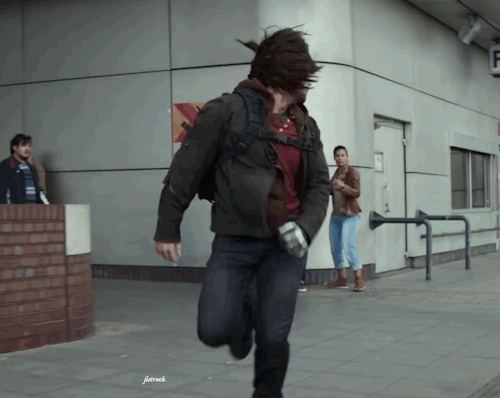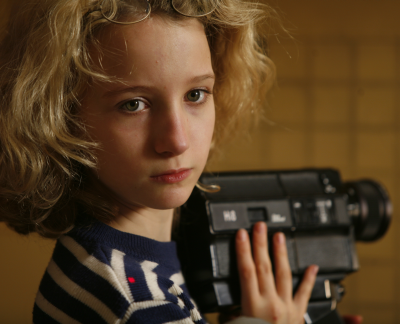The SparkNotes Version ;)
The ten code words used to control the Winter Soldier are a modern/sci-fi twist on a magic spell
The understanding of magic in the middle ages and today agrees that specific words or chants can create certain effects, including control over other people’s behavior
In the middle ages, science and corrupted scientific understanding were seen as a form of magic
In the popular imagination, magic is the unseen power behind events that are hard to explain or understand
Scholar Rosalind Morris states that in the mid-twentieth century Russian communism was a source of misunderstanding and, hence, a source of fear and unexplainable events
To certain scholarly points of view, elements of popular beliefs on about magic in Bucky’s story are effective in explaining how Hydra controls him and how he could possibly be saved
 |
| Warner Bros. Via Odessy Online |
The Full Version: Get ready to LEARN
Okay, first let me make the disclaimer that I do not write this post to endorse certain worldviews or ritual practices. I am only making a scholarly point.
Secondly, I don’t really have a good working thesis. This isn’t an official scholarly paper, but me using some of the things I learned at BYU to offer perspective. Look at these ideas more as the seeds of a scholarly dissection of some themes in the MCU. I don’t know enough about anthropology or folklore or medieval legends to know what I’m talking about, but I know enough to think I’m on to something
Third, if you haven’t seen Captain America: Civil War yet (and it’s been out for over a month), I would highly recommend that you do go see it before reading this.
Captain America: Civil War came out a few short weeks ago. While being the long-awaited third installment of the Captain America trilogy, like Marvel's other films it also came with some new symbols and motifs for the fandom to have fun with, notably the plums Bucky never got to eat and “Mission Report, December 16, 1991.”
 |
| Marvel via Moviepilot |
And then there’s the ten Russian code words that trigger the Winter Soldier’s programming. There’s something different about this aspect of Hydra’s Asset--it’s not like anything we’ve seen in the MCU before, nor like anything in other recent action/sci-fi films. It’s more like something out of a twisted fairy tale or a horror story.
To be honest, I don't like seeing the fandom joking around about the code words. It's gotten to the point where something that hurts a fictional character shouldn't be spoken of lightly. But why did the fandom take the code words in particular and run with them?
Longing...Rusted...Seventeen...Daybreak...Furnace...Nine...Benign..Homecoming...One...Freight car…What’s going on here?
I was up late one night getting ready for bed but thinking intently about the “cursed” words as I like to call them. I thought jokingly to myself, those words are so evil they could summon Satan.
And then I realized: WHAT IF THEY COULD?
 |
| Disney via Rebloggy |
My inner English major/Medievalist woke up. I grabbed my copy of Richard Kieckhefer’s Magic in the Middle Ages and pulled up my old term paper on medieval magic and started combing for evidence. Because, let’s face it, Bucky’s arc in Civil War did not end on a happy note. I needed answers. And I found some.
A Summary of Medieval Perspectives of Magic
Magic itself, I argued in my paper, is behind the things that cause surprise and wonder because of its inability to be explained--both for good and bad. Rosalind Morris writes that belief in the supernatural is the cultural explanation for trends and events that are harder to understand. It is what undermines reason, creates illusion, and defies the laws of nature. It is a foreign element that possesses the individual and causes random or tragic events to happen.
“Witchcraft is, in fact, the discourse that turns accident into violence, attributing agency to seemingly random events. In other words, witchcraft is cathartic theater in its purest form--tragic, universal, written in blood, and always failed. That is what anthropology teaches us” (Morris 115).
In the middle ages, the understanding of most people was that regular, controlled movements and sounds create effects that are out of the ordinary. Magic charms to invoke the effects of nature and/or supernatural beings carried over from antiquity, and the rites of the medieval Christian church took a similar role in common and elite culture. When a person went to church, for instance, the ritual of the Mass produced the effect of Transubstantiation, and being in a ritualized, spiritual environment created spiritual elation and awe in the participants. To the medieval imagination, the repetitive sounds of liturgical chants (particularly in Latin) and music and the spiritual perks of the worship service had a cause-effect relationship. Magic among the common people was a mix of liturgical rituals and folk superstitions, to generalize it badly. Among the clerical elite, necromancy involved a perversion of liturgical material in order to control demons. What was being said or done in these incantations and controlled movements or behaviors--crushing rocks, mixing certain plants, drawing diagrams--could have little or nothing to do with what was actually being done or why.
 |
| Via Pinterest |
The main distinction between the magical and the miraculous is that while miracles happen without human volition, magic invokes or controls supernatural forces. Magic is not religion or spiritual energy, but in some traditions, it can manipulate spiritual forces as well as forces in nature. It is “the other.”
Kieckhefer explains that spoken words, the more mysterious the better, are central to the use of magic. “The use of arcane language, whatever other significance it has, at least suggests...mysterious ingredients or processes” (68). He also cites the ideas of the writers of late antiquity and the medieval period:
“For the Egyptian writer Origen it is words that have magical power, and especially names. The names of demons, if pronounced in the right way, can be used to invoke them, command them, or exorcise them. Their names must be used in their original forms; they cannot be translated into different languages or they will lose their power” (39-40).
Monsters and Magic in the MCU
So, we have ten words in Russian, spoken to a brainwashed victim to control his behavior, usually while he is strapped to a chair. Specific words, in a specific language, in a specific order, spoken to a specific person. Even if it has been months or years since he has heard these words, they send him on a bloody rampage in seconds. He is helpless to resist the power of these words. It must have taken years of torture and conditioning to get this to work on Bucky.
 |
| Marvel via Propcake |
It doesn’t look like the “magic” we see in the Thor movies or the “magic” that will be explored in Doctor Strange. But, in my personal opinion, a lot of the magic we see in the MCU isn’t literally magic, it’s moments when moments when unexplainable things happen--when Peter Quill grabs hands with the other Guardians in spite of being ripped to shreds by the Infinity Stone, when Scott Lang returns from the Quantum Realm, when Steve Rogers acknowledges the little kid who recognizes him at the museum. And on the flip side, when Hydra does terrible, evil things to Bucky Barnes.
From the Medieval perspective, magic and science don’t have that much distinction. The methods that Hydra used over the decades to subject Bucky to their will look like corrupted science, knowledge of psychology and conditioning and human behavior put to evil use. Kieckhefer emphasizes that magic that controlled the will was considered evil or at least frowned upon in medieval society, a misuse of what ought to be used for good (81).
Furthermore, in Captain America: Civil War we have two elements that popular culture and medieval mindsets associated with magic: Hydra’s secret knowledge of how to control the Asset, and the secret book that contains this knowledge. Part of what makes Helmut Zemo such a terrifying villain is that he went to great lengths to obtain this knowledge for his scheme. He found the book buried behind a concrete wall and killed the guy he took it from. Medieval alchemists and magicians only shared or passed their knowledge amongst themselves, and what gave them their aura of mystery was the value they placed on their ideas. Their work was “cherished simply because it brings hidden things to light, or at least to the dim visibility of the shadows” (Kieckhefer 142). The books by which they accessed their power were prized highly and came to be considered talismans in their own right. They were not necessarily bloodthirsty for power, but people who didn’t understand what they were up to could have thought them to be.
 |
| Via Screenrant |
The Russian language itself is one of the “arcane” languages of the modern age. Rosalind Morris points out that during the Cold War, literal magic and witchcraft became benign in popular culture, while the public menace ferreted by the McCarthy “Witch Hunts” was Communism (117). The Winter Soldier was housed in Siberia, his handlers spoke to him in Russian, and his metal arm still had a communist red star before it was torn off violently by Tony Stark. In the cursed words themselves, there are three numbers: one, nine, and seventeen. One fan on Facebook pointed out that if arranged just so, you get the year 1917, which is the year Bucky was born. More conspicuously, however, 1917 was also the year of the Russian Revolution. Human minds and cultures are wired for symbols. Communism, facism, religious fanaticism, and ideological movements of any sort are based on rhetoric, and from the rhetoric springs the heavily loaded words that identify the movement.
Communist conspiracies once took the blame for the misfortunes of the twentieth century. In the twenty-first century, terrorism is the new witchcraft, being created by foreign extremists and causing mass destruction and societal chaos. World governments struggle to control this insubstantial force with laws that are met with protests that they are encroachments on personal freedom. In Civil War, the governments of the MCU pass the Sokovia Accords to control not just the terrorists but the superheroes supposed to protect the masses from them. No sooner has the signing ceremony begun than the building where the nations approving the bill is bombed by Zemo, masquerading as Bucky. The Winter Soldier is by all definitions in a world that closely resembles ours a terrorist--and it is a label he cannot escape. Terrorism is an unacceptable behavior, and yet Bucky becomes a terrorist as soon as someone says the “magic words.” Even without the specific triggers, Bucky Barnes is, by some scholarly definitions, a victim of sorcery.
 |
| Marvel via Vulture |
The Search for the Cure
I heard it said recently that superhero stories are fairy tales for adults. Playing with the metaphor just a little bit, the ten “cursed” words are of interest to the fandom because they are a twisted, modern version of a magic spell. They are yet another connection that Bucky’s saga has to popular stories and fairy tales about enchantments and curses. And for me, anything I’m obsessed with gets automatically connected to fairy tales and magic. It’s easier to explain this different world in those terms.
Any lover of fairy stories (like myself) knows there can always be a remedy for a curse. Bucky has already come across a few instances of “good magic” on his journey that significantly countered the effects of Hydra’s brainwashing and torture. If you remember in Captain America: The Winter Soldier, Steve got the Winter Soldier’s attention when he called him by name. To quote the narration in the new Cinderella, “Names have power.” And Kieckhefer’s book makes the exact same point.
 |
| Via Tumblr |
Then at the climax, Steve repeats the words “I’m with you till the end of the line” to Bucky. Those words sparked a memory: they meant something to him. The fandom has been nuts over the phrase “Till the end of the line” because of what they did. They changed his behavior: they changed his whole story. If those words aren’t magic, I don’t know what is.
While there wasn’t much evidence in the final cut of the film to back this up, Sebastian Stan spent the weeks leading up to the Civil War premiere teasing that Bucky’s backpack contains notebooks upon which he’s written his memories. The idea itself is powerful because it’s Bucky’s alternative to the trigger words and other secrets about the Winter Soldier written down by Hydra in that evil book Zemo had. You could say he’s creating his own “books” of good magic to counter the evil.
 |
| Definitely want to keep anything bad from happening to those notebooks--Via Tumblr |
But, as far as the actual MCU is concerned, that’s the best that Bucky and Steve have been able to do so far. And it’s not enough to keep Bucky’s inner demons at bay. It’s not enough to help relieve the guilt of the terrible crimes that Hydra used the Winter Soldier to commit. It’s not enough to keep Bucky from feeling like a monster.
The mid-credit scene in Civil War brings up more questions for Bucky than it answers--and leaving him hanging like that isn’t going to help anything.
Perhaps, like the way I have just divined the folkloric elements of the curse words that have power over Bucky, maybe the MCU will tap into a non-scientific or pseudo-scientific source for his remedy. I can’t help but think of the comment that the grandmother made in Leslie Silko’s Ceremony: “that boy needs a medicine man.” (Friendly reminder that the protagonist in Ceremony is a WWII vet with PTSD).
True, Bucky’s story is already trippy enough without bringing pagan and shamanistic remedies into the mix. But maybe there’s bits and pieces of something like that that could work for him. Wakanda is technologically advanced, but do they have traditional shamans and sorcerers who would know how to help Bucky? Do medical and psychological treatments in Wakanda involve a mix of traditional cures and modern medicines? It’s not unheard of in China, where according to a documentary I saw once acupuncture is mixed with modern medicine.
 |
| Via Superhero Hype |
But...if Bucky’s back on cryo, there weren’t any doctors in Wakanda who had any ideas for treatment off the top of their heads, traditional or otherwise. I’d like to think I’m on to something. Maybe I am reading too deep into this. I doubt the MCU will go that route but it's worth putting out there. Traditional cures work best for people within their cultures because they believe in them.
But there’s more than one way to eat a plum, I guess. To Tolkien, the modern industrial world was one of terror and the inspiration for Sauron and Saruman’s evil machinations. To him, the alternative was going back to traditional stories and legends as sources of comfort. Looking at the MCU, Bucky is a victim of the evils of the late twentieth century, of corrupt science and mental manipulation and foreign ideology. Something more ancient--more magical--could be available to help him. Some magic from Asgard or some of Doctor Strange’s mysticism. Maybe even an Infinity Stone. ( I haven’t read the comics, but I am aware that it was the Cosmic Cube that fixed Bucky at one point). The final solution might not be that straightforward, but it’s something to think about. As I said before, magic isn’t necessarily an actual power or spells and illusions. It’s something unexpected. Bucky needs whatever help he can get, and it may come from some place even I haven’t thought of.
 |
| New Line Cinema via LOTR wiki |
As for the cursed words, the fandom is just beginning to pick them apart. In the meantime, my gut reaction when I see them online or hear them spoken aloud is to cringe. I’m not saying the rest of you shouldn’t be writing them down and using them in memes to poke fun at Bucky. I am saying that it’s good to be aware of why the trigger words work in his story--and why I don’t like them.
Link: My Term Paper for ENGL 371, which I drew from heavily for this piece














